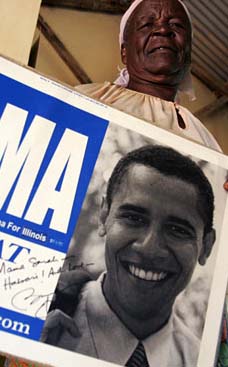
When the civil war came, in 2005 and 2006, it was an intra-Arab affair, between Shia and Sunni. By then, Kirkuk had become a very violent place, with an active Al Qaeda presence, but not on the scale I and others had imagined. Iraq’s other civil war, the one between Arabs and Kurds, remains a low-grade fight along the fault lines where the two communities meet, from Mosul in the northwest through the heartland of Kirkuk down into Diyala province along the Iranian border. And the main reason that this fight hasn’t metastasized is that the central question of Kirkuk’s future status—whether it will remain part of Iraq or join Kurdistan—keeps being put off. The scheduled referendum is postponed from year to year. Politicians and diplomats in Baghdad don’t want another apocalypse on their hands. But the question can’t be deferred indefinitely. Journalist George Packer served as a Peace Corps Volunteer in Togo.
George Packer writes: Kirkuk might be an early test of Obama’s withdrawal strategy and his vague promise to intervene if genocide should follow in the wake of our departure from Iraq
Restaurants of Kirkuk
In the summer of 2004, Kirkuk was the last city in Iraq outside Kurdistan where foreigners could walk the streets or eat in restaurants with only moderate risk. I went there three times and loved the place for its ancient, half-ruined streets, its variety of faces and languages, its relative tolerance and tenacity—Kirkuk is the Chicago of Iraq. But because of its terrible history under Saddam, its oil fields, and the competing claims of its three major ethnic groups, Kirkuk also seemed destined to be the fuse that would detonate an Iraqi civil war (I told the city’s story in this 2004 piece).
I was wrong: when the civil war came, in 2005 and 2006, it was an intra-Arab affair, between Shia and Sunni. By then, Kirkuk had become a very violent place, with an active Al Qaeda presence, but not on the scale I and others had imagined. Iraq’s other civil war, the one between Arabs and Kurds, remains a low-grade fight along the fault lines where the two communities meet, from Mosul in the northwest through the heartland of Kirkuk down into Diyala province along the Iranian border. And the main reason that this fight hasn’t metastasized is that the central question of Kirkuk’s future status—whether it will remain part of Iraq or join Kurdistan—keeps being put off. The scheduled referendum is postponed from year to year. Politicians and diplomats in Baghdad don’t want another apocalypse on their hands. But the question can’t be deferred indefinitely.
That a suicide bomber killed nearly fifty people in a restaurant north of Kirkuk where Arab and Kurdish leaders were meeting to discuss their differences does not come as a surprise. It was an obvious target for anyone who wants to destroy any chance of a peaceful answer to the question of Kirkuk’s future. All the better that many of the victims were women and children: it will outrage both communities and set them further against each other.
In my visits to Kirkuk I met a number of people of every ethnic and religious group who were sane—who considered themselves Kirkukis before any sectarian identity, and who hadn’t stopped talking to their counterparts in other groups, whatever their old and fresh resentments. These people were weaker than the demagogues and hard-liners, but they weren’t negligible or irrelevant; their idea of the city was a powerful one and it had an undeniable logic. After all, even Saddam had failed to complete his ethnic cleansing of Kirkuk. Why would anyone else be able to succeed? And who would want to try again?
Because it was relatively safe to meet in public, I did a lot of my talking with these Kirkukis over enormous lunches in restaurants, where I was inevitably treated. As the rest of Iraq became closed off to foreigners, I savored these sessions amid the chaos of waiters and dishes. In restaurants, a certain civic trust is an implicit part of the entry fee. You meet in a restaurant because you accept the existence and presence of others sharing the same public space, many of them strangers to you. This recognition seemed to underlie yesterday’s holiday feast at the restaurant called Abdullah. As such, it was a cruelly appropriate target of the terrorists.
It will be harder for the question of Kirkuk to be answered peacefully once the Americans have left. We’ve always been the buffer there; we only became the buffer everywhere else later on. So Kirkuk might be an early test of Obama’s withdrawal strategy and his vague promise to intervene if genocide should follow in the wake of our departure. It’s hard to be hopeful about Kirkuk, especially today. I’ve lost touch with the people I knew there; I don’t know whether their idea of the city still exists, or whether it can survive what happened at a restaurant yesterday.













